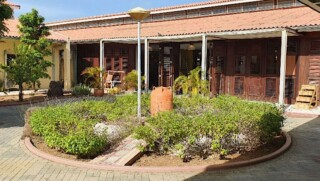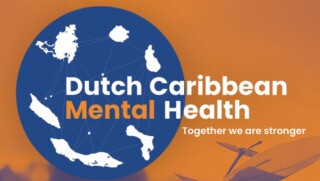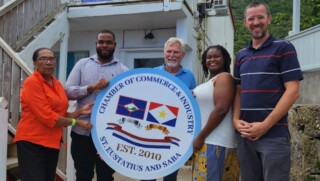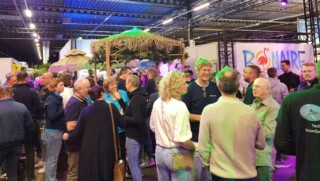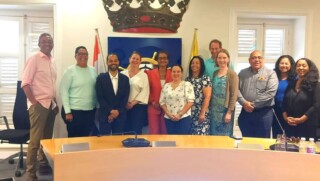Dutch NRC-paper: “How is St. Eustatius Doing Now That The Hague is in Charge”?
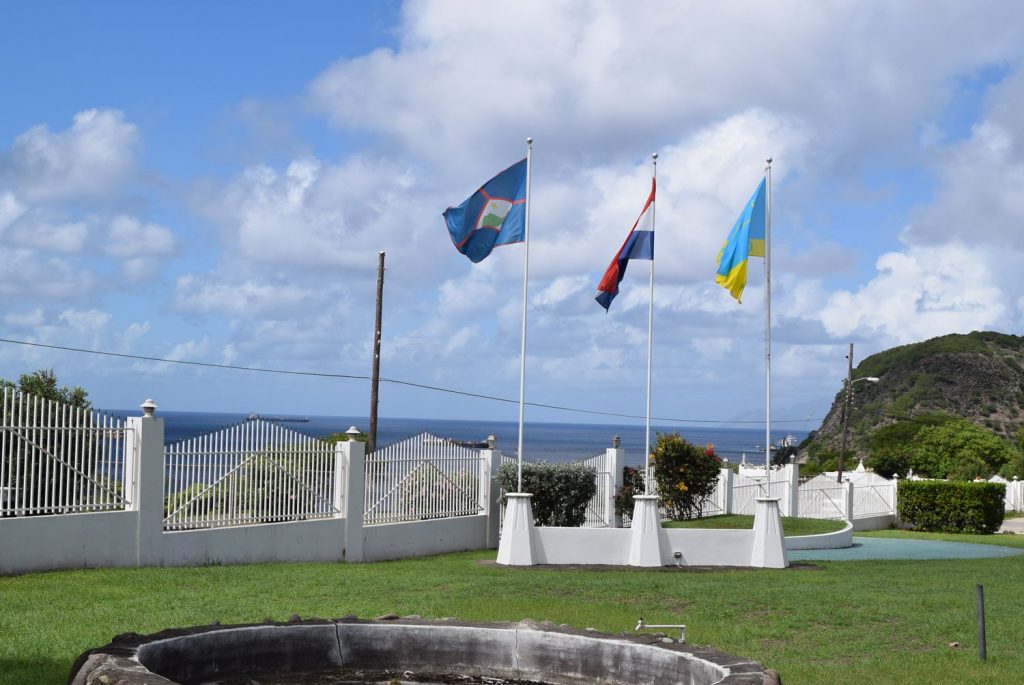
Flags are flying in front of the (temporary) Government Building. Photo: BES-Reporter
The Dutch Newspaper NRC has written an extensive article on the situation on St. Eustatius, now that they island is directly governed by The Hague. The newspaper contemplates the question if there has been progress on the island, since the Dutch takeover. “Opinions vary”, concludes NRC.
Below the BES-Reporter provides an English translation of the newspaper article:
The all-terrain vehicle of Koos Sneek is constantly shaking. Such a ride on St. Eustatius will immediately introduce you to the problems of the small island. Paved roads full of holes, chunks of stone on the sandy roads. Is there improvement since the Dutch government took over government in February? “It will take a long time,” says Sneek.
Sneek (67) is active in mortgages and insurance. He has been living on ‘Statia’ for over thirty years, as the English-speaking population says. Until February he was also part of the five-member parliament, the island council. It no longer meets since State Secretary Raymond Knops (Kingdom Relations, CDA) put the local government to the side half a year ago and appointed a government commissioner.
Knops did this because an investigative committee on St. Eustatius had found “gross neglect”. Under the previous executive council, there would have been “lawlessness” and “financial mismanagement”. It was the first time since the dismantling of the Netherlands Antilles in 2010 that The Hague placed one of the islands under guardianship.
Six months later, many people say on St. Eustatius: we are happy with the intervention, but we still see little result. The neglect is visible everywhere. In Oranjestad, the only village on the island with more than 3,000 inhabitants, you see many dilapidated houses. In the bushes along the road is waste, here and there are car and boat wrecks. The coralita, a parasitic creeper, overgrown almost all other plants and trees.
Groups of wandering goats can be seen on the whole island, another plague. “They eat everything broken and bald,” sighs Sneek. There is hardly any boundary for grazing areas, so that the hundreds of goats can come anywhere. The scorched rock walls erode. Sneek points to a large cliff. “A whole strip calves down because soil flushes into the sea.” The monumental Fort Oranje and the runway of the airport are threatened by it.
Government commissioner Marcolino Franco has been in charge of St. Eustatius for six months now. Franco, formerly active in Antillean politics, receives people at a long oval table. On the wall is a portrait of King Willem-Alexander and Queen Máxima, flanked by the flags of the Netherlands and St. Eustatius. The term ‘neglect’ was ‘quite right’, says Franco. He lists what he encountered: from computers that did not want to start up to procedures that were not legally enforced.
In snack bar Opa Snack in Oranjestad, Rechelline Leerdam admits that the previous government did not always follow the law. “In the general interest,” she says. Leerdam, until February party leader of the Progressive Labor Party (PLP), is still angry about the intervention of the Netherlands. Her party, since 2015 in the island government, came into regular clash with the Netherlands. PLP leader Clyde van Putten threatened last year that Dutch soldiers who would come to St. Eustatius after Hurricane Irma, “will be burnt and killed”.
According to Leerdam, decision-making was much too slow. The Netherlands interfered unfairly, according to her, with an agreement between St. Eustatius and the American oil company NuStar, which has a factory on the island. The deal was needed to complete the 2017 budget. She points out that a majority of the population expressed more autonomy during a consultative referendum in 2014. Due to a too low attendance, the result was in fact invalid.
Also government commissioner Franco thinks that the Netherlands has made mistakes. That poverty and income inequality after 2010, when Sint Eustatius became a special municipality of the Netherlands, have not been reduced, he calls “the greatest setback for the population”.
The government decided to raise the child allowance on Bonaire, St. Eustatius and Saba before the summer and to look at the level of minimum wages and benefits. Franco calls that “a first step”, but more jobs are needed, he says. That is why he has asked the Netherlands to invest in the maintenance of the many historical heritage on the island, to attract more tourists.
Former councilor Koos Sneek is critical of Franco, by whom he, as a politician, felt “ignored” in the beginning, partly because the democratically elected island council is inactive. Meanwhile Franco is talking to a group of political parties, minus the PLP. He does not want to recognize the new authority. Sneek thinks that despite these discussions “we still do not know enough what happens”.
Franco has now ordered all the decisions he has taken so far to be published. He holds office hours every Wednesday. Citizens can walk in without an appointment. The government commissioner acknowledges that for ordinary Statians the results are still “sparsely”. The improvement of the roads starts later this year, as the cables for electricity and internet are being put underground. But: “There are now fences against the goats near the cliff.”
Franco has a maximum of two years to help St. Eustatius. State Secretary Knops said that the government commissioners would “stay as short as possible and for as long as necessary”. The elections for a new island council would be in March. The political parties want them to move ahead, but the situation, says Franco, “cannot go back to how it was”.
A possible compromise is that the elections will continue and that the elected board will remain under the supervision of the government commissioner. Knops decides about this in December.
Franco is calmly awaiting to see what the decision will be. When he is satisfied? “If I leave here and the inhabitants of Statia feel that they have become better.”
The original article (in Dutch) can be seen here: https://www.nrc.nl/nieuws/2018/08/21/statianen-zien-nog-weinig-verbetering-a1613714


